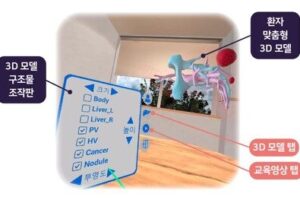
Impact of virtual reality education on disease-specific knowledge and anxiety for hepatocellular carcinoma patient scheduled fo
Abstract Purpose: Hepatocellular carcinoma (HCC) is a significant health concern, and the complexity of liver anatomy poses challenges in conveying radiologic findings and surgical plans to patients. This study aimed to evaluate the impact of a virtual reality (VR) education program on anxiety and knowledge in HCC patients undergoing hepatic resection. Method: From 1 January 2022 to 28 February 2023, 88 patients were enrolled in a randomized controlled trial, divided into the VR group ( n =44) and the control group ( n =44). The VR group received patient-specific 3D liver model education through a VR platform, while the control group underwent conventional explanation processes. Both groups completed preintervention and postintervention questionnaires assessing anxiety (using STAI-X-1, STAI-X-2, and VAS) and knowledge about liver resection. Comparison of the questionnaires were performed between the two groups. Multivariable logistic regression was performed to analyze factor related to decrease in anxiety. Result: While there was no significant difference in preintervention anxiety and knowledge scores between the two groups, the VR group exhibited significant reduction in STAI-X-1 scores (-4.14±7.5) compared to the control group (-0.84±5.7, P =0.023), as well as knowledge scores (17.20±2.6) compared to the control group (13.42±3.3, P <0.001). In the multivariable logistic regression model, VR education showed significant impact on decrease in STAI-X-1 score, postintervention. (OR=2.902, CI=1.097-7.674, P =0.032). Conclusion: The VR education program significantly improved knowledge and reduced anxiety among HCC patients compared to conventional methods. This study suggests that VR can be a valuable tool in patient education, enhancing comprehension and alleviating presurgical anxiety. 목적: 간세포암(HCC)은 중요한 건강 문제로, 간의 해부학적 복잡성 때문에 환자에게 방사선 소견과 수술 계획을 설명하는 데 어려움이 있다. 본 연구는 간 절제술을 앞둔 HCC 환자를 대상으로 가상현실(VR) 교육 프로그램이 불안과 지식에 미치는 영향을 평가하는 것을 목적으로 하였다. 방법: 2022년 1월 1일부터 2023년 2월 28일까지 무작위 대조군 연구에 88명의 환자가 참여하였으며, VR 그룹(n=44)과 대조군(n=44)으로 나누었다. VR 그룹은 VR 플랫폼을 통해 환자 맞춤형 3D 간 모델 교육을 받았고, 대조군은 기존의 설명 방식을 따랐다. 두 그룹 모두 불안(STAI-X-1, STAI-X-2, VAS)과 간 절제술에 대한 지식을 평가하는 사전 및 사후 설문지를 작성하였다. 두 그룹 간의 설문 결과를 비교하였고, 불안 감소와 관련된 요인을 다변량 로지스틱 회귀분석을 통해 분석하였다. 결과: 두 그룹 간 사전 불안과 지식 점수에는 유의미한 차이가 없었으나, VR 그룹은 STAI-X-1 점수에서 유의미한 감소(-4.14±7.5)를 보였으며, 대조군(-0.84±5.7)과 비교하여 통계적으로 유의미한 차이를 나타냈다(P=0.023). 또한 지식 점수에서도 VR 그룹(17.20±2.6)이 대조군(13.42±3.3)보다 유의미하게 높았다(P<0.001). 다변량 로지스틱 회귀분석에서 VR 교육은 STAI-X-1 점수 감소에 유의미한 영향을 미쳤다(OR=2.902, CI=1.097-7.674, P=0.032). 결론: VR 교육 프로그램은 기존 방식보다 환자의 지식을 향상시키고 불안을 감소시키는 데 효과적이었다. 본 연구는 VR이 환자 교육 도구로서 이해도를 높이고 수술 전 불안을 완화하는 데 유용할 수 있음을 시사한다. Yang J, Rhu J, Lim S, Kang D, Lee H, Choi GS, Kim JM, Joh JW. Impact of virtual reality education on disease-specific knowledge and anxiety for hepatocellular carcinoma patient scheduled for liver resection: a randomized controlled study. Int J Surg. 2024 May 1;110(5):2810-2817. doi: 10.1097/JS9.0000000000001197. PMID: 38377058; PMCID: PMC11093422.

